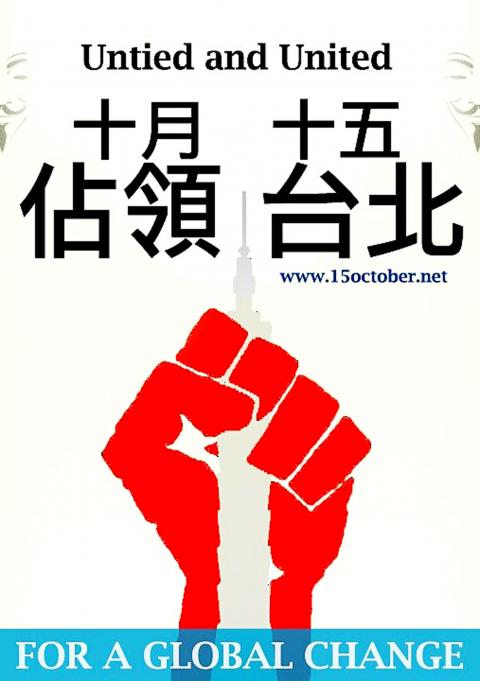The Occupy Wall Street protest that began on Sept. 17 in New York is spreading to Taiwan with Occupy Taipei (佔領台北), an event organized that takes place tomorrow outside Taipei 101, beginning at 1:01pm. As of yesterday, more than 1,400 people have said on the group’s Facebook page that they will join the event, which takes aim at social inequality and corporate greed. Although some foreign nationals have expressed concern that attending the protest may lead to arrest and possible deportation, the National Immigration Agency told the Taipei Times that foreign nationals who are legal residents of Taiwan could attend a protest if a permit has been applied for and granted six days before the protest date. As of Wednesday afternoon, the Xinyi Police Department had yet to receive an application from organizers. However, a message posted by co-organizer Kimba Vetten on the Occupy Taipei Facebook page said, “people who organize protests will be helping us and be informing people of their rights and what to say when police ask you questions. Taiwan hasn’t arrested protesters for a long time. Twenty years ago — yes, but not today. Anyway this is a peaceful gathering.”
■ Occupy Taipei (佔領台北), Taipei 101
■ Tomorrow beginning at 1:01pm

Photo courtesy of Occupy Taipei
■ On the Net: occupytaipei.tw

A vaccine to fight dementia? It turns out there may already be one — shots that prevent painful shingles also appear to protect aging brains. A new study found shingles vaccination cut older adults’ risk of developing dementia over the next seven years by 20 percent. The research, published Wednesday in the journal Nature, is part of growing understanding about how many factors influence brain health as we age — and what we can do about it. “It’s a very robust finding,” said lead researcher Pascal Geldsetzer of Stanford University. And “women seem to benefit more,” important as they’re at higher risk of

Eric Finkelstein is a world record junkie. The American’s Guinness World Records include the largest flag mosaic made from table tennis balls, the longest table tennis serve and eating at the most Michelin-starred restaurants in 24 hours in New York. Many would probably share the opinion of Finkelstein’s sister when talking about his records: “You’re a lunatic.” But that’s not stopping him from his next big feat, and this time he is teaming up with his wife, Taiwanese native Jackie Cheng (鄭佳祺): visit and purchase a

April 7 to April 13 After spending over two years with the Republic of China (ROC) Army, A-Mei (阿美) boarded a ship in April 1947 bound for Taiwan. But instead of walking on board with his comrades, his roughly 5-tonne body was lifted using a cargo net. He wasn’t the only elephant; A-Lan (阿蘭) and A-Pei (阿沛) were also on board. The trio had been through hell since they’d been captured by the Japanese Army in Myanmar to transport supplies during World War II. The pachyderms were seized by the ROC New 1st Army’s 30th Division in January 1945, serving

Mother Nature gives and Mother Nature takes away. When it comes to scenic beauty, Hualien was dealt a winning hand. But one year ago today, a 7.2-magnitude earthquake wrecked the county’s number-one tourist attraction, Taroko Gorge in Taroko National Park. Then, in the second half of last year, two typhoons inflicted further damage and disruption. Not surprisingly, for Hualien’s tourist-focused businesses, the twelve months since the earthquake have been more than dismal. Among those who experienced a precipitous drop in customer count are Sofia Chiu (邱心怡) and Monica Lin (林宸伶), co-founders of Karenko Kitchen, which they describe as a space where they